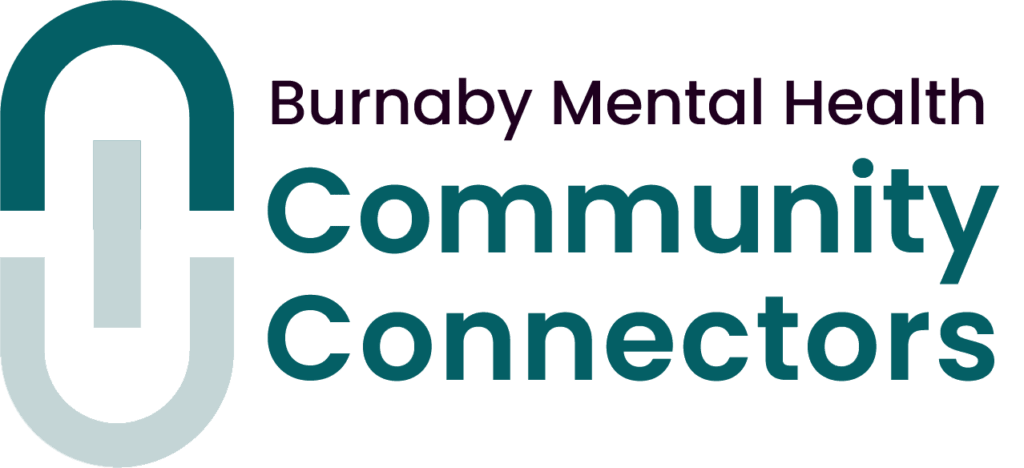Burnaby Mental Health Community Connectors

The Mental Health Community Connector (MHCC) training prepares frontline community service or social agency staff to signpost their clients to local services that support mild to moderate mental health.
MHCCs do not provide direct medical services. Instead, they are trained to notice indicators of poor or declining mental health, connect clients with appropriate mental health resources, and encourage healthy coping skills.
Please email us at [email protected] if you are interested in taking the training!

Upcoming Trainings
Our first training dates in 2024 have yet to be announced. If you or your organization would like to participate in a training, please fill out our form to express your interest.

Burnaby Resource Directory
We have also created a resource bank identifying local resources that support mental health and its social determinants.
What will you learn from the Mental Health Community Connector training?
This short 4-hour long training will help you support your clients’ mental health. Training modules include:
Module 1
Introduction to Mental Health and Self-Care
- Define mental health, a mental health problem, and a mental health disorder
- Understand the local mental health context
- Recognize indicators of poor or declining mental health
- Explain the importance of respecting cross-cultural views of mental health
- Identify factors that impact mental health and access to mental health care
- Describe daily activities that support mental health
- Create SMART goals for self-care
Module 2
Mental Health Community Connectors (MHCCs)
- Describe the role of MHCCs.
- Recognize biases about mental health.
- Apply the ALGEES (Approach, Listen, Give, Encourage, Encourage, Self-care) Action Plan and trauma-informed care to help clients experiencing mental health challenges.
- Recognize indicators of risk for suicide and know how to refer clients to immediate help.
Module 3
Signposting and Resource Navigation in Burnaby
- Understand what signposting involves.
- Navigate the Burnaby Resource Directory.
- Explain how to support a client to register for a long-term family physician or nurse practitioner in BC.
To build capacity in community to conduct these trainings, we have created a facilitator’s guide and associated resources to empower community providers to provide the training to their community or organization. These resources are available by request. Please reach out to [email protected] for copies of our training materials.
Please take the Mental Health Community Connector training first before facilitating it for your colleagues. We also recommend you reach out to [email protected] for support with learning how to facilitate the training!
Download Training Materials
FAQs
I’m a front-line staff member with a community agency. How can I take the training?
Please express interest by filling out the online form!
How much does the training cost?
It is completely free!
Is this the same training as Mental Health First Aid?
No. The Mental Health First Aid training offered by the Mental Health Commission of Canada is a 8 hour certified training program centered around helping people experiencing a mental health crisis and is available at a cost. If you are interested in taking the Mental Health First Aid training, please reach out to the Burnaby Primary Care Networks at [email protected].
Who facilitates the Mental Health Community Connector training?
Mental Health Community Connector training sessions are currently being led by Burnaby Primary Care Networks clinicians (registered counsellors and social workers).
In addition, the project aims to build capacity in community to conduct these trainings; as such we have created a Facilitator’s Guide and associated resources to empower community providers to provide the training to their community or organization. We recommend that interested providers first take the 4-hour Mental Health Community Connector training, as well as reach out to our team at [email protected].
Why are Mental Health Community Connectors important?
The Burnaby Division of Family Practice (BDFP) shared a survey with the public in the summer of 2022 to better understand local MH experiences. Three hundred forty-three people participated. About half of these individuals reported experiencing MH issues (43%). Most of these people described their indicators as mild (54%) or moderate (39%). Respondents listed the top barriers to MH care in Burnaby. They were:
- High costs of services
- Long wait times
- Lack of trust in the system
- Lack of awareness of existing supports
- Short term (“one-and-done”) supports
- Challenges accessing transportation to in-person MH support
Research reveals that across British Columbia, existing MH services are not well connected.10 Access to MH supports are increasingly needed as COVID-19 has worsened MH 11-17 As social inclusion fosters positive MH,10,18 it is important to work with community to improve access to MH supports.
The Collaborative Care Model and MH Care Management informed the MHCC training.1-3 The MHCC training was also inspired by the Frome Model of Enhanced Primary Care (a.k.a. the Frome Model or Compassionate Frome).4-6 The Frome Model is effective as it focuses on forming networks of community services. Some Canadian cities have implemented the Frome Model to improve community well-being (see WestView Primary Care Network).7-9
Can community providers from communities other than Burnaby take the training?
Absolutely! Although the training is geared toward Burnaby providers, the skills taught in this training course are useful regardless of which community you serve. The Burnaby Resource Directory focuses on resources relevant to the Burnaby community, but also includes resources that service other communities too.
What do past trainees think of the training?
100% of the 9 trainees who completed the pilot evaluation agreed that the training:
- increased their confidence to support their clients’ mental health
- increased their confidence to support their own mental health
- improved their ability to signpost clients to Burnaby mental health resources
- was overall satisfying
Some comments from trainees included:
“Friendly environment, great content and up to date knowledge”
“I liked the ALGEES method and the opportunity to practice it in the breakout rooms.”
“A very good training session. Added much to my knowledge and awareness. The services availability map across Burnaby is a great tool.”
Funded by Shared Care
Produced as part of the Burnaby Division of Family Practice project, “Sharing Care with Community: Supporting a Patient-Centered Approach to Mental Health Care”
Created in November 2023
If you have any questions, please reach out to [email protected].


Sources:
- Leung LB, Young AS, Heyworth L, Rose D, Stockdale S, Graaff AL et al. Do collaborative care managers and technology enhance primary care satisfaction with care from embedded mental health providers? J Gen Intern Med. 2020; 35(12): 3458-3464. doi: 10.1007/s11606-020-05660-1
- Druss BG, von Esenwein SA, Compton MT, Rask KJ, Zhao L, Parker RM. A randomized trial of medical care management for community mental health settings: the primary care access, referral and evaluation (PCARE) study. Am J Psychiatry. 2010; 167: 151-159. doi: 10.1176/appi.ajp.2009.09050691
- Nutting PA, Gallagher K, Riley K, White S, Dickinson WP, Korsen N et al. Care management for depression in primary care practices: findings from the RESPECT-depression trial. Ann Fam Med. 2008; 6(1): 30-37. doi: 10.1370/afm.742.
- Health Connections Mendip. Health Connections Mendip service overview 2018-2019. London GB-ENG: National Health Service; 2021. Available from: https://healthconnectionsmendip.org/wp-content/uploads/2023/08/Services-Overview-1-1.pdf
- Firman, S. Case study: the Frome model of enhanced primary care [Internet]. London GB-ENG: Shift Design; 29 Apr 2019 [cited 6 Feb 2023]. Available from: https://shiftdesign.org/case-study-compassionate-frome/
- Holt-Lunstad J, Smith TB, Layton JB. Social relationships and mortality risk: a meta-analytic review. PLoS Med. 2010; 7(7): 1-20. doi: 10.1371/journal.pmed.1000316
- Abel J, Kingston H, Scally A, Hartnoll J, Hannam G, Thomson-Moore A, et al. Reducing emergency hospital admissions: a population health complex intervention of an enhanced model of primary care and compassionate communities. Br J Gen Pract. 2016; 68(676): 803–810. doi: 10.3399/bjgp18X699437
- Health Connections Mendip. Annual report 2016. London GB-ENG: National Health Service; 2016. Available from: https://healthconnectionsmendip.org/wp-content/uploads/2021/02/hcm-annual-report-2016.pdf
- Health Connections Mendip. Our model [Internet]. London GB-ENG: National Health Service; 2023 [cited 6 Feb 2023]. Available from: https://healthconnectionsmendip.org/our-model/
- Government of British Columbia. A pathway to hope: a roadmap for making mental health and addictions care better for people in British Columbia. Victoria BC CAN: Government of British Columbia; 2019. Available from: https://www2.gov.bc.ca/assets/gov/british-columbians-our-governments/initiatives-plans-strategies/mental-health-and-addictions-strategy/bcmentalhealthroadmap_2019web-5.pdf
- Vigo D, Patten S, Pajer K, Krausz M, Taylor S, Rush B, et al. Mental health of communities during the COVID-19 pandemic. Can J Psychol. 2020; 65(10): 681–7. doi: 10.1177/0706743720926676
- British Columbia Centre for Disease Control. Summary: BC COVID 19 SPEAK round 2 data provides insight into how people in B.C. are coping with pandemic [Internet]. Vancouver BC CAN: British Columbia Centre for Disease Control; 2021 [cited 31 Jan 2023]. Available from: http://www.bccdc.ca/Health-Info-Site/Documents/SPEAK/SPEAK_Round2_Summary.pdf
- Office of the Provincial Health Officer. Examining the societal consequences of the COVID-19 pandemic [Internet]. Victoria BC CAN: Office of the Provincial Health Officer; 2021 [cited 31 Jan 2023]. Available from: http://www.bccdc.ca/Health-Professionals-Site/Documents/societal_consequences/Mental_Health.pdf
- City of Vancouver Social Policy and Projects. Populations disproportionately impacted by COVID-19. Vancouver BC CAN: City of Vancouver Social Policy and Projects; 2021. Available from: https://vancouver.ca/files/cov/pdi-covid-current-state-report-january-2021.pdf
- Nowak DA, Mulligan K. Social prescribing: a call to action. Can Fam Physician. 2021; 67(2): 88-91. doi: 10.46747/cfp.670288
- Pacific Blue Cross. New study shows that mental health of nearly half of British Columbians continues to duffer during COVID-19 [Internet]. Burnaby BC CAN: Pacific Blue Cross; 29 Jan 2021 [cited 3 Feb 2023]. Available from: https://www.pac.bluecross.ca/news-articles/2020-bc-mental-health-study/
- Raveendran L, Kharpal K, Weston NA, et al. The impact of COVID-19 on mental health and well-being: a focus on racialized communities in the GTA. Ottawa ON CAN: Mental Health Commission of Canada; 2022. Available from: https://www.wellesleyinstitute.com/wp-content/uploads/2022/03/The-Impact-of-COVID-19-on-Mental-Health-and-Well-being-A-Focus-on-Racialized-Communities-in-the-GTA.pdf
- Hamfelt A. Social inclusion: the key determinant of mental wellness. Vancouver BC CAN: Canadian Mental Health Association of British Columbia; 2019. Available from: https://cmha.bc.ca/wp-content/uploads/2019/12/POL_BuildingEquitableFoundation_LitReview_8.5x11_2019_12_04.pdf
